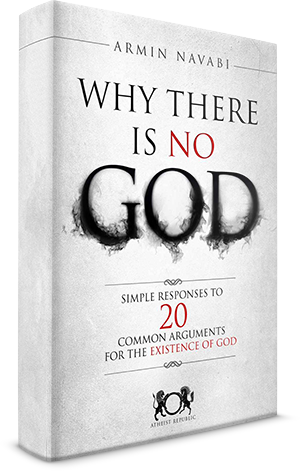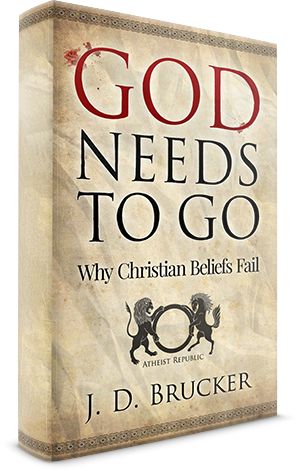I am good with the Big Bang theory
Donating = Loving
![]()
Bringing you atheist articles and building active godless communities takes hundreds of hours and resources each month. If you find any joy or stimulation at Atheist Republic, please consider becoming a Supporting Member with a recurring monthly donation of your choosing, between a cup of tea and a good dinner.
Log in or create an account to join the discussions on the Atheist Republic forums.




























@David
"Agreed, the consensus is that there was "something" that preceded the big bang"
Sorry to be a noodge.
I once asked a physicist acquaintance " what was there before the big bang?"
His reply: "There WAS no before". I can't get my head around that. However, that doesn't mean he's wrong necessarily.. I still don't know and I have no problem with that.
Regardless, even if there was something , but we don't know what, we may not then claim 'therefore god'
Seems to me some believers are so insecure in their faith that they are terrified of admitting "I don't know" to any metaphysical question. I think our new little friend belongs to that crowd
Thought for today "If the answer to your question is God, you are probably asking the wrong question" (Tarquin S Shagnasty)
...I know I’m late to this thread...Jesus fuckin shit, what the fuck was I doing?!?!...
I just wanted to ask two questions regarding “...am nothing without God brother,”
Narrowing in on “brother”. 1) How busy was your dad? And 2) Fellow posters who care - you gonna let him talk about your mom like that?!?!??
John 3:16: is not in our earliest texts. Consider the following.... "While much that was in his documentar(See Authentic New Testament). Footnote: y source (the Memoirs of John the Priest) has been adapted by the Greek author to bring the text into line with his ideas, as here, some passages, largely by way of commentary, stand out as his distinctive contribution. Whenever possible attention has been drawn to these, as in this instance, and some have been placed below the main body of the text and in slightly smaller type. The present passage is John 3:16‑21. [This passage has been so placed by the translator].
The Ferrar Fenton Bible Translation has the following in bracket indicating that the verse WAS ADDED BY THE TRANSLATORS at some point in time.
[For God so loved the world that He gave the only‑ begotten Son, so that every one believing in Him should not be lost, but have eternal life. For God did not send His Son to the world that He might condemn the world; but that He might save the world through Him...] and ends with John 3:21, Therefore it would appear that all the verses from John 3:16 forward to John 3:21 were added.
It appears that John 3:16 was not in the original Gutenberg Bible. You can see for yourself at the following "url:
http://www.gutenbergdigital.de/gudi/eframes/index.htm
: *** “For God so loved the world,…” but 1 John 2:15 believers that God wants them NOT to love the world: “Love not the world, neither the things that are in the world. If any man love the world, the love of the Father is not in him.”
https://www.debunking-christianity.com/2012/05/why-john-316-is-lie-in-it...
@ Cog
I am not entirely sure that the Fenton translations are to be taken as mainstream thought.
John 3:16 on appears in Koine Greek texts and papyrii, Syriac bible, Wycliffe's and Vulgate bibles as well as Codex Sinaiticus, all predating Gutenberg by centuries.
"Only begotten" has been altered in each verse to "one and only" or similar by NIV, RSV, GN, LB, NEB, JB. The NKJV marg., Ne and the NASV each support the Arian reading in 1:18 that Jesus was a "begotten God."
"Only begotten" is "monogenes" and this reading is found in the vast majority of manuscripts (TBS (58) "The Only Begotten Son"). The TBS. ibid, states that "only begotten" is the correct reading, supported by the Latin "unigenitus," found in Codex Harleianus, a 10th century copy of the 2nd century Old Latin. Hills (3) p 133, (38), states in his discussion on 1:18 that the Latin versions and Curetonian Syriac support this passage. Ruckman (2) p 110 states that the removal of "begotten" from John 3:16 was achieved in the Alexandrian manuscripts (Papyrii 66, 75, Aleph, B) by erasing "his" and thus weakening the emphasis which would yield "only begotten." The reading "only begotten God" has been traced by Burgon to Valentinus, a 2nd century heretic who no doubt influenced Origen. It is preserved in Papyrus 66, Aleph, B, C, L and the Peshitta (Hills, ibid). Ruckman (31) p 369, states that Papyrus 75 and the "4th correcter" of Aleph added the "the" as found in the NASV. Ruckman (2) p 119, also states that Tertullian (150 AD), Athanasius (325 AD) and Chrysostom (345) rejected the reading as found in Aleph, B etc. Berry's Greek text supports this passage.
See also the extensive discussion in Part 3 on John 1:18, in opposition to Dr. Oakley's support for the heretical reading of the NIV.
"http://ecclesia.org/truth/manuscript_evidence.html"
That these verse were interpolated at some point is moot, we now know that John was the work of several authors, was written after the other gospels, was (as all them are) anonymous. The difference being; Johns gospels all claim to be eyewitness accounts by a singular observer yet were written by different authors, and that the "eyewitness", the anonymous "well loved disciple" doesn't appear in other Gospel versions of the Resurrection.
It would seem that this particular verse so beloved on Christians actually refers in translation to ( and I am vague on this it not being my particular speciality) a rehashing of the earlier "begotten son" stories in the Pentateuch and Moses promise from god that Israel is the son. Updated by the composers of John to upstage and confirm the dominance and divinity of the Jesus figure in the stories.
OMS: Thanks.... Reading the link now.
Asking what was 'before' the big bang is like asking what is north of the north pole.
It's a nonsensical question.
It's almost as nonsensical to ask, "how can something come from nothing!"
What is 'nothing'? Show us what and where it is!
It appears to me that certain individuals (tends to be the ironically titled, 'intelligent designers') are privilaging very basic terms.
@Random Re: "What is 'nothing'?"
Damn... Why y'all always making this shit more complicated than it is? Listen...
Nothing is what you have if something isn't there. Obviously, you cannot have something and nothing at the same time. If you have nothing and then gain something, then you lose nothing in the process, meaning you have actually lost something, which is nothing. However if you happen to lose something, you may still actually have something unless, of course, nothing is there to replace it. And if nothing replaces something, then you have still gained something, which is nothing. See how easy that is?
Tin....
Nothing in your post made sense. However I did get something out of it, so I guess something did make sense...ahhhh, fuck you. Jesus Christ, I hate it when you best me.
@Fievel Mousekewitz OP
Of note: I am high as I write these:
I am certain there are people out there that know a lot more about this and the relevant topics, but, I don't think there is a "why" I tend to gravitate towards "it was inevitable" A pattern of perfect sameness nothing, interrupted by inevitable slightest difference, that difference sometimes leads to a long chain of events that includes you and me, and everything else. Inevitable due to no constraint of "space" - distance, unlimited possibility.
How? Probably way too complex for us to ever grasp fully.
I dont think its a good idea to think of the "big bang" as certain ingredients coming together.
That's good that you are: "fine with dying and ceasing to exist."
I am not there yet ;)
Maybe my answer above on how and why helps. Probably not, but hey I am high :)
@LogicFTW
Some things we just don't know.
Found this to be interesting.
https://www.youtube.com/watch?v=dr6nNvw55C4
Edit; I'll have some weed next week I hope. ;)
wow. Lots of reading. What a great ending with Logic being high.
Pages